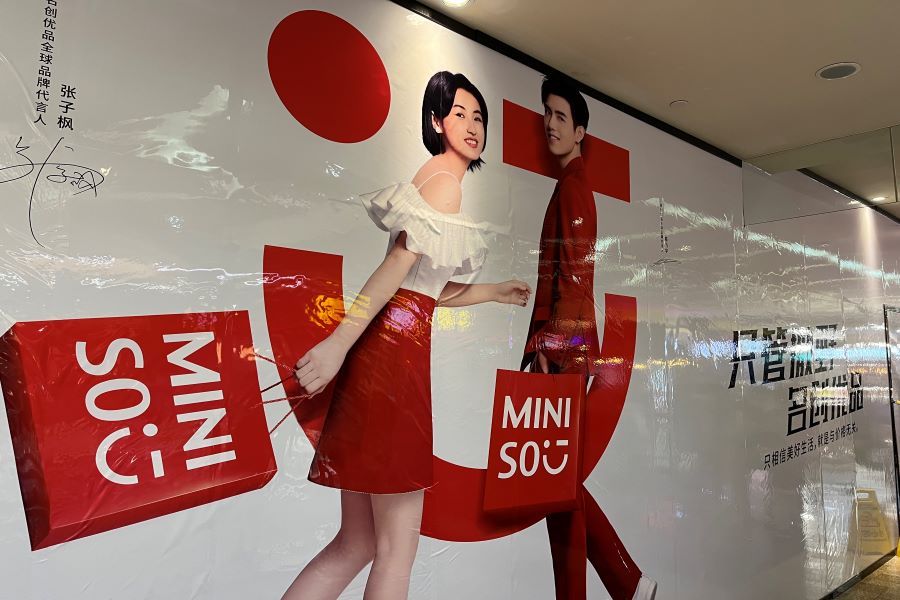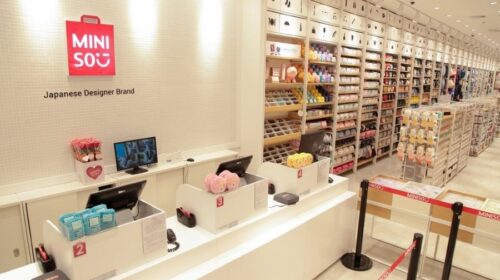Miniso Steps Up International Expansion in Search of Fatter Profits

Japan-inspired budget retailer’s overseas revenue is growing rapidly, helping it improve margins, following aggressive international expansion
Key takeaways:
• Miniso said it plans to open four new stores in Italy this year, bringing its total to 14 since entering the market in April, and add more in Milan next year
• Company began expanding overseas after two years in operation, with higher-margin international business now growing far faster than domestic sales
By Warren Yang
Miniso Group Holding Ltd. (MNSO.US) has come a long way since emerging as a knock-off of Japanese retailers less than 10 years ago.
At its inception, consumers might have brushed off the chain of small stores selling cheap knick-knacks like toys and makeup as just another Chinese copycat. But it has grown into a respectable global brand since then, with stores in major cities around the world. And it’s stepping up its international campaign to set up shops in bigger numbers and more countries, a strategy that could lead to more profitable revenue growth but also brings a range of new risks.
Miniso said last week that it will open four new stores in Italy by year end and add more in Milan next year, marking the latest in a steady stream of announcements this year detailing its aggressive global push. The company entered Italy in April, and since then has grown to 10 outlets. Across Europe the company now has nearly 170 shops in 21 countries.
Miniso was founded in 2013 by Ye Guofu, who used a number of major Japanese retailers for his inspiration. The chain’s logo is reminiscent of fast fashion retailer Uniqlo, and its products resemble a mix of the minimalist household goods sold by Muji, as well as those from dollar store chain Daiso. Ye came up with the concept for the brand during a family trip to Japan, after being impressed by local specialty stores selling high quality yet affordable products made in China. He even hired a Japanese designer, Miyake Junya, to lead his company’s design team.
After just two years in operation, Miniso started expanding outside China – even into North Korea at one point to establish a short-lived business – and now has more than 1,800 stores in nearly 90 overseas markets. In the first nine months of this year alone, 90 new Miniso stores popped up outside China, raising the total number of international outlets by more than 19%. The company’s domestic store count grew at a slower pace of less than 10% over that period, though domestic shops still account for more than 60% of its total.
Revenue from its overseas operations is also growing faster, and more profitably, than domestic sales. In the three months to September, representing the company’s first quarter of fiscal 2022, revenue from international markets jumped 78% year-on-year, more than four times the pace of sales growth in China. As a result, overseas revenue increased to 23% of the company’s total during the three months from 17% a year earlier.
Overseas sales are not only driving overall revenue growth but also carry higher margins than domestic sales, according to the company. While Miniso doesn’t explain why margins outside China are higher than at home, that may be partly because the retailer maintains higher levels of inventory in its home market, which means a higher cost of sales and a lower gross margin.
The types of low-cost knick-knacks that are Miniso’s specialty also typically sell for much higher markups in western markets than in China, where competition is fiercer and where many of the products the company sells are actually manufactured.
Franchise Model
Miniso is actively pushing a franchise model, with the landing page of its English website prominently featuring a banner inviting franchisees for a long list of countries. The strategy saves the company the burden of bearing operating expenses for each store. A distinguishing feature of Miniso’s program is that it retains ownership of inventory for outlets run by its franchisees, suggesting it pays costs associated with maintaining that inventory as well.
As higher-margin overseas sales led its overall revenue growth, the company’s overall gross margin improved to 27.4% in its latest fiscal quarter from 25.2% a year earlier. Operating expenses increased, but at a far slower rate than revenue, likely helped by the shift to the franchise model. In China, Miniso had only four directly run stores out of more than 3,000 at the end of September, while the number of such directly run stores overseas totaled 108 out of more than 1,800.
As a result, Miniso swung to a profit of 154.5 million yuan ($24 million) during the period from a loss of 1.7 billion yuan a year earlier.
Yet overseas expansion is not without risks. Ironically, one risk is that competitors might try to replicate Miniso the same way it took its own inspiration from Japanese retailers. In its home market, Miniso has already become “an attractive target of copycat(s),” the company said in its annual report for the fiscal year that ended in June 2021. The same trouble can arise overseas, especially in emerging markets where intellectual property protection is weak.
Similarly, Miniso also faces the risk of lawsuits alleging infringement of intellectual property, which could not only cost the company financially but also damage its reputation. To defend against such risks, Miniso has licensing deals with dozens of companies owning popular brands and icons, including Marvel and Disney characters. But such arrangements also carry risk if agreements end and Miniso is forced to write down inventory of related unsold products.
Miniso stock is down nearly 50% in the past year and now trades at just over half of the $20 price of shares from its 2020 IPO. But that’s likely at least in part because of overall sour sentiment among investors for retail stocks because of the Covid-19 pandemic. Hong Kong-listed shares in Fast Retailing (6288.HK), which owns Uniqlo, have lost about a quarter of their value in the past 12 months as well. On top of that, investors have become cautious on Chinese stocks in general over concerns including a regulatory crackdown on an increasing number of sectors in China. So far retail hasn’t been affected by any such crackdown.
Miniso hasn’t made an annual net profit since it went public. But if it finishes the current fiscal year in the black as analysts polled by Yahoo Finance expect, it would trade at a decent forward price-to-earnings (PE) ratio of about 29, based on its latest share price. That is lower than a trailing PE ratio of 42 for Fast Retailing but higher than 14 for Tokyo-listed Ryohin Keikaku Co. Ltd. (7453.T), the owner of Muji.
That indicates investors are still rather optimistic about Miniso’s growth potential, and international expansion will be instrumental for the company to live up to those expectations. The question becomes whether it can strike a balance between rapid growth and prudent risk management.
To subscribe to Bamboo Works free weekly newsletter, click here





